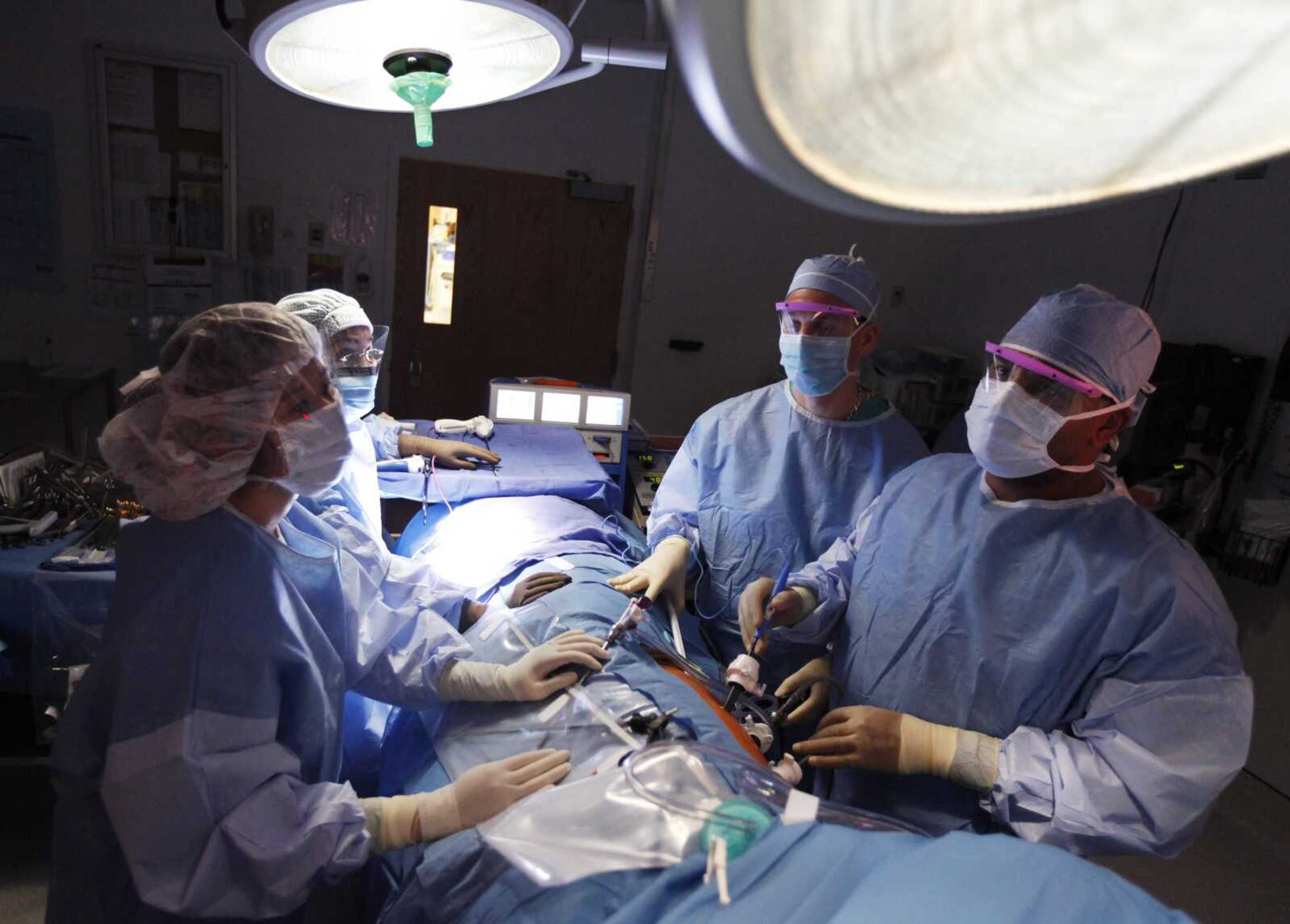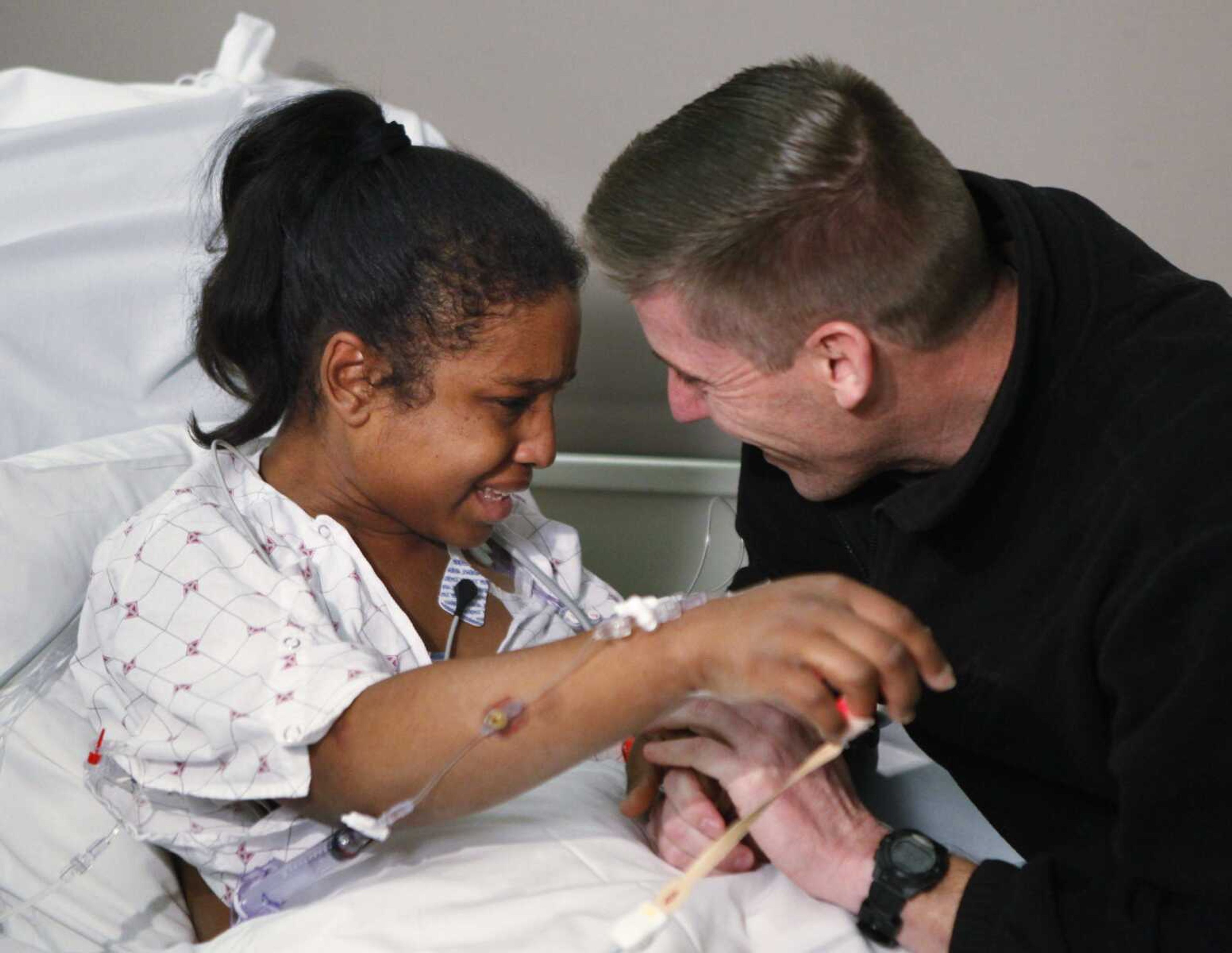Twenty-six operations, 13 kidneys and the kindness of strangers gives hope to those who had little
WASHINGTON -- Twenty-six operations put healthy kidneys into 13 desperately ill people: Doctors in the nation's capital recently performed a record-setting kidney swap, part of a pioneering effort to expand transplants to patients who too often never qualify...
WASHINGTON -- Twenty-six operations put healthy kidneys into 13 desperately ill people: Doctors in the nation's capital recently performed a record-setting kidney swap, part of a pioneering effort to expand transplants to patients who too often never qualify.
"A whole new doorway of hope opened," said Tom Otten, a suburban St. Louis police officer who traveled halfway across the country to Georgetown University Hospital to give a stranger a kidney so his wife would get one in return.
Relative after relative failed to be the match his wife, Irene, needed. Tests finally showed her body wouldn't tolerate a kidney from 95 percent of the population.
In Washington, Roxanne Boyd Williams was a similar long shot. A sister's kidney had saved her in 2005, but it failed this year. This time around, the 30-year-old mother's immune system also had become abnormally primed to attack any new organ.
Dr. Keith Melancon, Georgetown's kidney transplant director, offered a rare option. If both women could receive a close-to-perfect donor kidney -- one that few of their immune system's elevated antibodies recognize -- he'd filter from their blood enough of the remaining anti-bodies to allow the new organ to survive.

A kidney exchange widens the pool of potential organs. That's when patients find a friend or relative who isn't compatible with them but will donate on their behalf, and the pairs are mixed and matched.
Tom turned out to be Roxanne's needle in the haystack. Another young woman was Irene's. Roxanne's father came from Florida, the answer for yet another impossible-to-match grandmother.
"It's a large gift to give somebody, something so selfless," Williams said, her hand clutching Otten's as the two meet a week after surgery. "God bless you."
The chain reaction -- multiplied by three altruistic donors, people offering a kidney to anyone -- turned into a 13-way transplant, during six marathon days of surgery at Georgetown and nearby Washington Hospital Center. It's believed to be the largest exchange of its kind in a movement that could reduce the nation's long and growing wait for a donated kidney.
Five patients got kidneys only because of the blood-filtering.
"You are going to die a lot earlier sitting on that dialysis machine than if you get transplanted," said Melancon, whose goal is to pair domino kidney exchanges and the blood-cleansing treatment called plasmapheresis to narrow the troubling disparities.
Fewer than 17,000 kidney transplants are performed a year.
"These procedures really multiply the number of transplants that can be done," Melancon said, predicting the two together could enable up to 4,000 additional transplants a year. "It's really almost a religious experience when we start doing this, because it's miraculous, it really is."
The Associated Press documented weeks of the complex logistics, the ups and downs as Melancon's team planned initially for a 16-way transplant, juggled donors and recipients for best matches and had to drop some out -- including one with heart problems that aborted his surgery.
In the end, 13 pairs emerged with life-altering bonds.
"I'm ready," Roxanne Boyd Williams said with a smile as nurses wheel her gurney toward the operating room. She's been counting the days, anxious to end the dialysis that leaves her too drained to provide much care for her 2-year-old twins and 7-month-old.
Williams was in college when lupus struck, rapidly destroying her kidneys. A kidney from her sister survived treatment for post-transplant cancer, a blood-clotting disorder and the twins' birth, only to fail with her second pregnancy.
"I'd like to be supermom for once," Williams said wistfully. "To really tell my kids, 'I'm here for you, I'm not sick, we'll go to the museum, we'll go to the park.'"
Back in Missouri, Irene Otten's kidneys failed with no warning a year ago. Otten, now 40, went to the emergency room because of a racing heartbeat only to learn she needed immediate dialysis. Doctors couldn't explain why; her only known risk was some high blood pressure.
Then an aunt saw a news story about Melancon's work with the blood-filtering treatment, and Tom Otten tracked him down.
Now, it's Dec. 4 and as Roxanne Williams goes under anesthesia, across the hallway Melancon already is snipping tissue, millimeter by millimeter, to extract Tom Otten's kidney.
Working laparoscopically -- through two tiny holes, guided by cameras -- Melancon gently lifts Otten's spleen out of the way. He winds around nearby organs and glands, like easing the kidney out of a shell.
Three hours in, Melancon pauses, his blade near the ureter, the tube that carries urine from the kidney to the bladder.
"This is the point of no return. Ask if everything's fine next door," he tells a nurse. Reassured, he rapidly makes the final cuts and wiggles the kidney through a 4-inch incision low on Otten's abdomen.
"It's a beautiful kidney," Melancon exclaims, laying it in a bucket of ice and heading for Williams' operating room.
In that OR, surgeons have some positioning to get tall Tom Otten's left kidney into petite Roxanne Williams' right side. Her left side contained too much scar tissue.
Then there's the size. Your kidney is about the size of your fist. That makes Otten's probably twice as big as Williams'.
Blood vessels finally aligned, Dr. Raffaele Girlanda meticulously stitches in the kidney. The room stills in anticipation. Clamps off, Williams' kidney rapidly plumps up and turns a healthy purplish-red. A "whoosh" sounds as doctors check and find a strong pulse inside the organ.
And, "oh look at that!" Melancon points: Almost immediately, urine flows out, what Melancon calls the champagne of kidney transplantation.
Exactly a week later, a nervous Otten peeks into Williams' hospital room, unsure what to say. "I think you have something of mine," he joked as Williams reaches out for a teary hug.
The night before surgery
On the eve of their dual surgeries, Tom Otten of suburban St. Louis tried to ease his nervous wife, Irene, by composing this poem about the impending donation of his left kidney:
'Twas the night before surgery and all through the body
Two kidneys were resting, no need to go potty.
The liver spoke up and to the kidneys did nag
"One of you is going for a trip, you better pack a bag."
The kidneys ignored him for they knew he was drunk
They never liked the liver, he was a smart--- punk.
Right kidney said to left, "I hope it is me
Because I feel sorry for anyone who just cannot pee."
Left kidney said back, "No I'll be the one."
Right kidney replied, "You have all the fun."
Realizing that they would see each other no more
The two kidneys decided to celebrate galore.
They stole the liver's whiskey and began to drink
But then the anus showed up and put up a stink.
"Be quiet up there, I must get my rest."
He said it with anger and not in jest.
So the kidneys obeyed and put an end to the clatter
And said to each other, it really did not matter
If one is to leave and one is to stay.
They knew they would both be OK.
They said their goodbyes and had a good hug
Until a hand reached in and gave one a tug.
"Goodbye and good luck," shouted the one on the right.
"Merry Christmas to all and to all a goodnight!"
Connect with the Southeast Missourian Newsroom:
For corrections to this story or other insights for the editor, click here. To submit a letter to the editor, click here. To learn about the Southeast Missourian’s AI Policy, click here.









